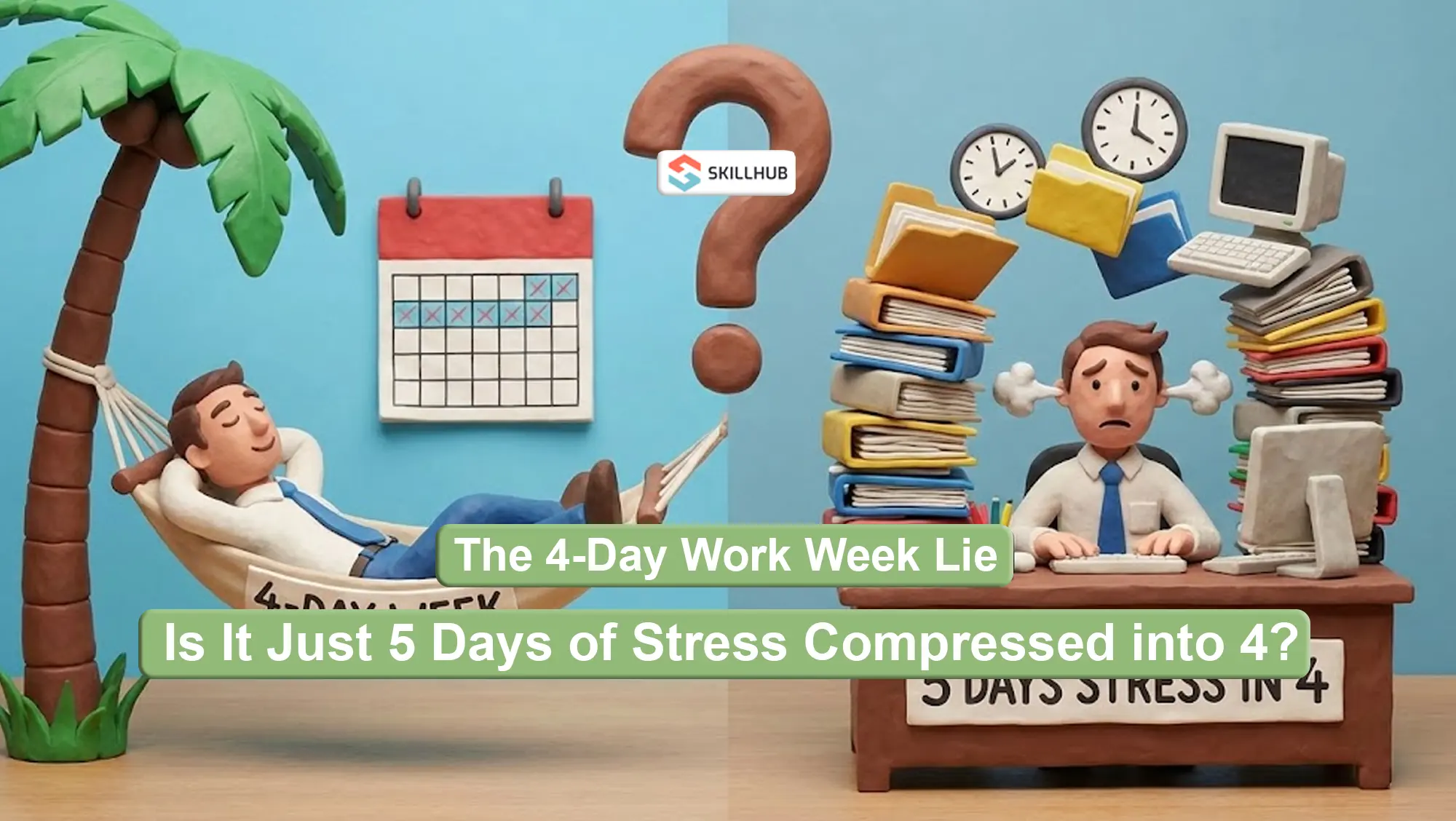How to Leave Your Current Company and Properly Transition to Another
%20(1).png)
It’s quite easy to get used to working in one place. You’ve spent years at the company, and you grew accustomed to everything. But, as time goes by, you get this tickling feeling about changing your things. But there are always doubts when you start thinking about resigning from a job. Should you quit right away? In certain cases, that’s the best option, but only in certain cases. Mostly, leaving your job in a proper manner is an art that every professional should learn.
How to Resign From a Job Responsibly
The career coach and branding strategist Chelsey Jay recommends putting your own professional interests first. It may seem that having an attitude like that will surely lead to always seeking to land a better job. The problem is that things are not that simple. Firstly, we all get used to the company we are working for. And if not for the benefits, you're inclined to continue working at the company as it has turned into a habit.
Chelsey Jay offers some tips on how to resign, especially if you want to leave your current job on good terms and smoothly transition to another company. There are things you need to consider before even notifying anyone about your intention to leave. And there are questions that you need to ask yourself and your current employer.
If you decide to resign, you might have a write my resume request. The best option to make a resume work for you is to create a personal brand or hire a professional resume writing service and take the most out from your experience. Choose a certified resume writer to be sure you get a professionally written one!
Reasons to Move On
Chelsea: Deciding to leave a company is never easy, but I encourage professionals to always put their best interest ahead of any company they work for. When a professional says that they are thinking about leaving a company, I tell them that it is important that they make an informed and well thought out decision. I advise professionals to sit down and reflect on what is going right at their company and what is going wrong. Asking the following questions will help provide clarity.
Finding the best way to resign starts with figuring out the reasons you want to move on. Aside from being prepared to answer your current employer’s question on why you want to leave, you need to have an answer for yourself. So, let’s take a look at those questions.
Are You Still Learning Something New?
Challenging yourself is one of the best ways to enhance your skills. Almost every job is an opportunity to learn something new. However, if you run out of challenges, and fall into a routine, you might get bored pretty soon.
When there’s nothing new to learn, your work becomes monotonous, and you end up hating it. If that’s what you are experiencing, it can be a solid reason to move on. Rarely, someone can maintain a great performance when the job doesn’t offer any challenges.
Have You Started Getting Tired Faster Than Before?
It is normal to get tired by the end of the week. Depending on your job, it is normal to get tired by the end of your working day. But if you experience getting tired by noon, and there’s no medical condition to explain it, most probably, the reason behind your fatigue is your job. If you start procrastinating within several hours since the start of your working day, it can signify that you are on the verge of burnout.
Burnout doesn’t necessarily mean the end of it all. Consider taking several days off or going on vacation earlier than planned. But if that doesn’t work, you should truly consider leaving your job.
Are You Complaining About Your Job More Often?
Let’s be fair, there’s always something to complain about at work. It can be a really tough day. There’s a new colleague that you can’t stand. An employee who cannot understand their assignments. The manager has been too moody. The project’s vendor doesn’t know what they want, et cetera. Complaining about the job is quite a healthy habit.
But if you start noticing that you complain about your work on a daily basis and with no particular reason, that’s a red flag. Once again, it can be a sign of an upcoming burnout, which can be solved by taking a vacation. But it also can be a sign that it’s time to change your company or profession.
Does Your Income Still Satisfy You?
There are various reasons why we opt for this or that job. It can be a passion for a particular field or an opportunity to gain skills that can come in handy on the career path. But more often than not, we pick jobs based on salaries. Your work’s compensation can be fixed or can depend on your performance.
Now, ask yourself whether your income corresponds to your performance? Or, even better, whether you think that your salary still corresponds to your performance? If the answer is no, and there’s no satisfying explanation from the employer, it can be time to look for other opportunities.
Cover letters are crucial for landing a dream job that is why almost half of the job seekers (47%) write them. A lot of employers decline applications without them. That is why you should look through the cover letter examples change of career to help yourself out.
If you’re considering leaving because of salary concerns, a top compensation consulting firm can help evaluate whether your current compensation package aligns with industry standards and offer guidance on negotiating a better deal.
Is There Anywhere to Grow on Your Job?
Based on your individuality, you either want a promotion or you are happy with the position that you already occupy. Regardless of that, you can be offered a promotion based on your work performance. If you start getting bored in your current position, think about the opportunities within the company you work for. Can you get promoted to project manager? Are you interested in that? If the possible promotions are out of your interest, and you’re getting gradually bored with your current occupation, you can start thinking of resignation.
Chelsea: After reflecting on these questions, you should feel a sense of clarity and direction on moving forward. Once you decide it is truly time for a change, it is important to prepare for the transition.
Things to Ask Yourself Before Leaving
Now, after figuring out the possible reasoning for leaving the company you work for, there are still some questions to ask yourself left. To do things professionally, one must keep their head cool. It is easy to make up your mind that you are not satisfied with your current job and start writing your resignation letter. But keep it cool, and meditate on the following questions.
What Do You Like and Dislike About the Current Company?
Before that final “I resign”-thought pops up in your brain, you need to think about the company you are currently working for. Think about the benefits that your current job brings you. Consider what you like about the company, and what you dislike. If the disadvantages outnumber things that you like — resign.
Are Your Reasons to Leave Negotiable?
After considering your reasons for resigning from work, think about whether they are negotiable or not. Is it possible that your employer will offer you something that will make you stay? A salary raise, a more flexible schedule, a possibility to work from home, a promotion, et cetera. Only if you are sure that nothing is going to make you stay, can you notify your company that you are leaving.
Is Your Company Aware of Your Needs?
A certain dichotomy between your needs and what the company provides you with is one of the main reasons for quitting the job. But before making that move, ask yourself whether you’ve made your needs known to the company? If you haven’t, there’s no way to make sure that resigning is the best option.
What Are Your Career Goals?
You need to consider or reconsider your career goals. Think about whether the current company or the current position provides you with the possibility to reach what you are aiming for. Is there any goal that you can reach within your current company? If changing the company is the only way to pursue the new heights, then politely indicate it as one of the reasons why you want to resign from the position.
Do You Need a Career Change or New Challenges?
There’s also a possibility that you want to change your career, rather than leave for another company that offers you new challenges. If you want a career change, learn if you have such possibilities within your current company. If so, you just need to resign from your position, instead of switching companies but nevertheless to create a god LinkedIn profile for searching new job opportunities if you need some help with it visit linkedin writing service page.
Things to Consider For Your Future Job
Chelsea: The job search and interview process is not the most exciting activity in the world and can be very time consuming, which is why it’s important to understand what you need in order to thrive and be happy at a new organization.
After going through the previous ten questions, you should’ve got a clear picture of how to properly quit a job. Treat your former employer-to-be respectfully, provide your reasoning for resignation. All that is done gracefully. But that’s not the end of it all. After formally leaving your post, you will get involved in the job-seeking process. And it is always better to know beforehand what you are looking for. So, here are the things to consider for your future career steps.
Is There a List of Companies You Want to Work For?
Chelsea: It is a good idea to identify organizations that you want to work for. Once you’ve identified organizations, start making connections by reaching out to current and previous employees to ask questions about the culture, current initiatives, and any information they have on current openings.
There’s a chance that before resigning from a job, you’ve set your eyes on one or several companies you’d like to work for. Do the study properly. Learn about their culture. You can go even that far and fish out former and current employees to ask them questions, to learn whether the company practices what it preaches.
Are You Willing to Improve Your Existing Skills or Learn New Ones?
In case there's no particular company you want to work for after you’ve resigned from your job, you need to think about what you are planning to achieve. Are you looking for the same position as you had, but with more challenges? Or are you looking for an absolutely different occupation where your resume skills are required, but where you will learn a lot of new things? Set your goals straight. If you want to move on in IT sphere then you should visit this page it writing service.
What Values Do You Expect Your Future Company to Have?
Are there any specific traits that your prospective work should have? Does the ideal company you want to work for strictly follow the rules or embrace boldness? Are you more of a work-should-be-work person or a work-should-be-fun one? Picking up a place to send your resume is much easier when you know what you want to see in the company.
Chelsea: Once you make it to the interview stage, do not be afraid to ask the questions that relate to your non-negotiables, needs, and career goals!
What Does Your Ideal Workday Look Like?
One of the most popular interview questions is “Describe your ideal workday”. But it’s not about interview preparation. Something, most likely, dissatisfied you about your workdays in your previous company, which made you resign. So, think about what your ideal workday consists of. Ask about the typical workday in the company you want to apply to, and see whether it matches your vision of it.
What Are Your Non-Negotiables?
Last but not least, you need to think about non-negotiable aspects of your work/life balance. If you don’t want to think about resigning any time soon, you need to set the boundaries. Is it okay for you to work overtime when it is required? Are you willing to work on weekends from time to time? Are you okay with the strict from 9 to 5 schedule? Think about it before making a final decision.
How to Resign From a Job Without a Plan
Planning everything beforehand can be considered the best way to resign from a job. But that doesn’t mean that you cannot resign without a plan. Although it may be considered irresponsible, certain cases require you to act fast. A toxic workplace or a stressful job. Or less tragic, you’ve lost interest in what you are doing, and you need a break to figure things out. If you have a strong decision take a look on how to write a resignation letter on this article.
But there’s an employment gap! Yes, there is. And while it’s a common belief that it’s harder to find a job with an employment gap, it’s far from being true. All you need is a good explanation of it. And there’s no reason to invent nonexistent volunteering or anything. Just be transparent about why you’ve resigned and taken time off.
%20(1).png)



%20(1).webp)